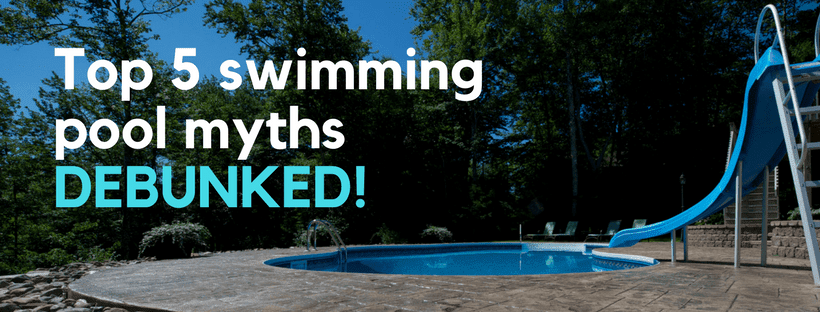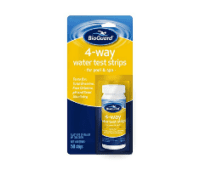Top 5 Swimming Pool Myths: Debunked

The world of pools is full of myths, ones that often effect how people view their pool or others. We at R&R hear these on a daily basis and we thought we should share with you and debunk the most common swimming pool myths.
- You must wait an hour after eating before swimming.
Oh, Mom. You always did have our best interest at heart! But it was always so hard to wait when the water was so inviting! So, could you really die from swimming too soon after eating you lunch? Not likely. As your food is digesting, more blood goes to the stomach and other digestive organs to speed the process along. This means there is less blood for your muscles. If you are using your muscles enough that they steal blood from digestion, you can get a cramp. However, if you eat a sensible meal, and take it easy for a while after returning to the water, even the risk of a cramp is very low. That being said, if you eat a 3-course meal and dive straight into a 100m front crawl, you could have a different result!
- There are pool chemicals that reveal urine in pool water.
Pop culture has reinforced this myth so much it has almost become common household knowledge! If you pee in the pool a dark blue cloud will appear around you and everyone will know you peed in the pool! Although we would have a hard time stocking a product such as this, it just does not exist. Should you become aware of someone peeing in your pool by traditional means, don’t worry! Your sanitizers will eliminate any risk of contamination very quickly. Your only problem will be deciding who you let back in your pool!
- Owning a pool is a lot of work!

Many people dream of owning a pool of their own, though not many ever pursue that ownership! After all, pools are a lot of work and stress, right? Wrong! Here at R&R we firmly believe that pool ownership should be as rewarding and easy as swimming itself! Here are the main things a pool owner should do to ensure a stress-free pool-maintenance experience:
- Have your water tested and follow your instructions. At R&R we offer free, professional water analysis to all our chemical customers. After each test customers receive a detailed, step-by-step plan for their water balancing and weekly maintenance. Each chemical is listed in order of use with quantities converted to household measuring cups for easy use. We suggest having your water professionally analyzed at least once per month
- Test at Home. At R&R we offer two at-home water testing kits. We sell testing strips and testing drops (your preference) for convenient at home testing. While not as accurate as professional analysis, regularly testing at home helps to keep an eye on the chemicals in your pool.
- Open early, close late. One of the best ways to ensure a problem-free pool is to increase the time it is open for. When you wait until late in the spring (late May) to open your pool, you give it much more time to facilitate the growth of algae. When you close your pool late, you allow the water to cool, so as not to let algae grow over the winter.
- Education. The best way to ensure you don’t have problems with your pool is to learn about it! R&R Pools offers semi-annual seminars on pool maintenance, in-store lessons, as well as hands on lessons at the convenience of your own home. The best way to effectively maintain your pool is to ask questions and learn for yourself how to take care of your investment.
4. “Salt pools are chlorine-free”.
hayward aqua trol
This is one of the largest pool-myths of all time. Salt pools are better because they don’t have that “harsh chlorine” in them. This is entirely false. The basis of a salt pool system is the formation of hypochlorous acid (free available chlorine) through the electrolysis of salt in water. Electrolysis occurs through a device called an electrolytic chlorine generator (ECG) that is installed on your pools system. Simply put, Salt pools are chlorine pools and an ECG is the equipment through which salt is converted into chlorine.
5. Chlorine gives people red-eye during swimming.
We’ve all experienced, or at least seen, the horrors of red-eye from the pool. Irritated, itchy red eyes are often blamed on an excess of chlorine in a pool, but that is almost never the case. While swimming pools can indeed provide irritations, the culprit is actually chloramines, a by-product of chlorine, which result from an improperly, often under-chlorinated pool. Pools that maintain a normal level of chlorination (1-3 ppm) will not cause such symptoms. The other, more common issue that causes irritation of the eyes is improperly balanced pH. Your eyes and skin have a natural pH of 7.5 and any value too far off [either higher or lower], can cause irritation. We recommend the pH in pools to be between 7.4 and 7.6 to keep the irritations away. What about Rashes and swimmer’s ear? These issues are usually caused by bacteria, bacteria that thrives in under-chlorinated water. The issue is typically a lack of chlorine, not an excess.
We hope this article helped to clear up some of the common misconceptions people have about swimming pools. The more you know, the easier pool ownership becomes!
